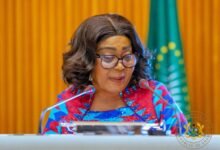Govt commits to deepening democracy—IMCC Exec Sec.
Mr Mahama Salifu, the Executive Secretary of the Inter-Ministerial Coordinating Committee on Decentralisation (IMCC), says the government is committed to deepening local democracy, improving internally generated revenue of assemblies and promoting local economic development.
This commitment is shown in the new National Decentralisation Policy and Strategy (NDPS 2020-2024) that has been formulated by government to address systemic challenges of local democracy and local economic transformation in Ghana.
Speaking at the nationwide series of sensitisation workshop on the NDPS (2020-2024), Mr Salifu noted that the recent attempt by the President, Nana Addo Dankwa Akufo-Addo to cede some of his constitutional powers to the citizens to elect their own metropolitan, municipal and district chief executives (MMDCEs) demonstrated the commitment of the government to make democracy a reality by extending it to local leadership and ensuring that MMDCEs were accountable to local residents.
He said to ensure that, the president through the new decentralisation policy aimed to bring not only government and services closer to the people but also accountability.
Mr Salifu argued that without downward accountability, local democracy was not complete and that the new policy among its objectives was to fulfil the requirements under Article 240(2) (e) of the 1992 constitution, which provided for accountability of local government authorities to the people in local government areas.
The policy which was approved by Cabinet in December 2019, was funded by the European Union delegation to Ghana and the sensitisation workshop brought together regional coordinating directors and economic planning officers, district coordinating directors, budget analysts, planning officers, traditional authorities, civil society organisations, private enterprises and other key stakeholders across the country.
The participants were carefully selected to discuss all the 22 policy measures envisaged with related activities, outputs and timelines for implementation over the next five years.
The roles and responsibilities of the stakeholders were discussed to ensure that there was effective and efficient implementation as well as monitoring of achievements and shortfalls for immediate remedies.
He said with its overarching objective to achieve quality service delivery through a democratically decentralised local governance system and active citizens’ participation, the new decentralisation policy puts local residents at the centre of local governments’ services provision and accountability.







